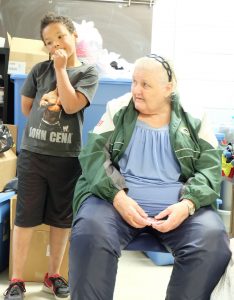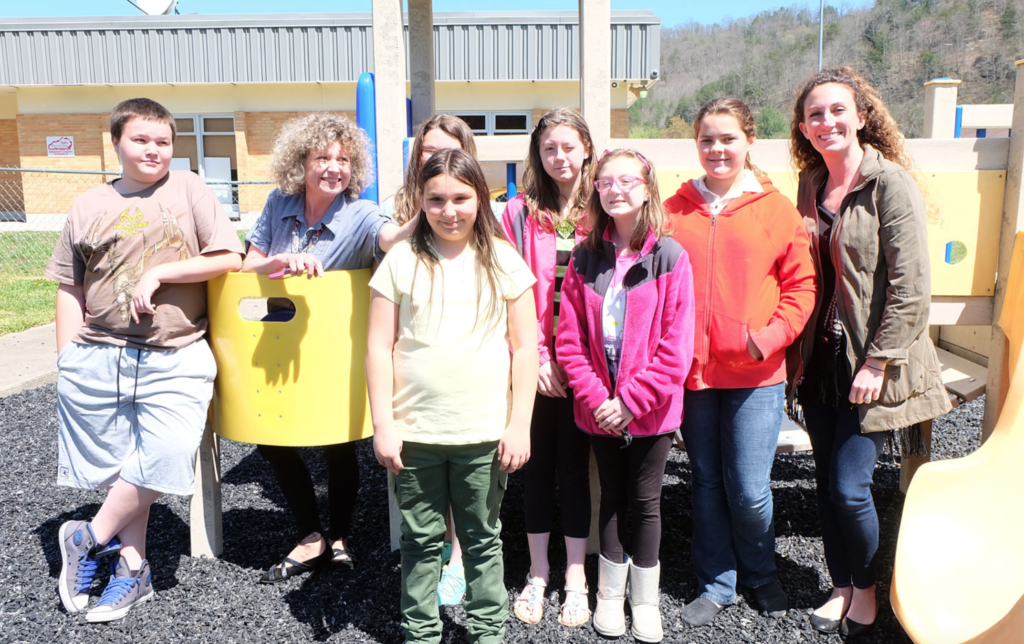Bolivia is still fresh in my mind as we head out on I-64 to get to our next destination: Williamsburg, Kentucky.
I am joined this time by Shelley Oxenham, who manages relationships with all of our U.S. volunteer coordinators. Shelley has worked for Children Incorporated for eight years. She works closely with our volunteers and has watched many of the children we serve grow up and graduate.
One of the great things about a road trip is that it gives you time to think. In the past, when I thought of poverty in America, I immediately pictured the urban poor – children raised in inner-city slums amid gangs and street crime. But in Appalachia, poverty has a different face. Whitley County with a population of 36,000, is a picturesque mountain community in eastern Kentucky – or it would be, if not for the visible signs of economic decline. The collapse of the coal industry hit the entire region hard, and the railroads have cut jobs as well. In their place, a booming meth trade has sprung up, along with the accompanying deaths, drug addiction and incarcerations.
Shelley and I arrive on a Tuesday morning to meet with Sherry Paul, Children Incorporated’s volunteer coordinator at Whitley Elementary School. Eight children are enrolled at the moment, with a long waitlist of others in need of help.
Where have all the parents gone?
Almost all of the children here live in poverty. The drug problem has left a disproportionate number of children essentially parentless. There are so many grandparents raising children that the school has set up a support group for them.
More than emotional support, what they really need is concrete help. Over 90 percent of the children at the elementary school qualify for reduced lunch prices because of their income and for many, school is the only place where they’re guaranteed a proper meal.
The lack of food at home is particularly a problem during the winter break, when the kids face more than a week without a meal. In the days leading up to Christmas, Sherry makes gift baskets for the children, packing in flour, sugar, butter, peanut butter, bacon, eggs, bologna, hot dogs, bread, Pop-Tarts and oatmeal so their grandparents have something to cook for them.
Aging caregivers – a whole new challenge

Dennis with his grandmother
Two hours up the road from Whitley County is Jackson, where we met with Genevieve, the volunteer coordinator at LBJ Elementary School. There are 28 children enrolled in the Children Incorporated program here, and most are in a similar situation to those in Whitley.
One of them is Dennis, an 11-year-old who, in many ways, is a typical fifth-grader. He’s into basketball, football and riding his dirt bike. But Dennis and his two siblings live with their great-grandparents, who are in their 80s with failing health.
In addition to food, clothes and school supplies, which all of the Children Incorporated families need, Dennis’ family also needed a ramp at the house for his great-grandmother, Gail, who can’t manage the front steps. Genevieve coordinated the project, enlisting the high school vocational students to build the ramp for free with all of the supplies purchased by Children Incorporated.
We met Gail at the school, where she was attending a nutrition class set up for parents, grandparents and great-grandparents trying to raise children on meager incomes (most bring in less than $10,000 a year). The nutrition class helps them figure out how to make the best of what they have, and while they’re there, they can pick up the food and supplies that Genevieve provides thanks to Children Incorporated funding.
Building a new future
Twenty minutes down the road, we visit Wolfe County Middle and High schools, where volunteer coordinator, Connie, takes care of 72 children at the middle school and 52 at the high school. It’s a big enough job that she’s got an intern helping her out because for the teens, the immediate needs of food and clothes are only one concern – their near future looms large on the horizon.
There aren’t many jobs here for kids after graduation, and there are no good ones. The Dairy Queen, Save-A-Lot and hardware store are the best job prospects for graduates who stay in town. Most residents who do have jobs commute to factories or logging sites in other communities.
Along with food and clothes, Connie must also prioritize travel for her high school students. The Children Incorporated funds pay for students’ class field trips to other areas, allowing the kids to at least see other parts of the state. It’s the only time many have ever left eastern Kentucky and for some, the only time they ever will.
Connie’s goal is to get the graduates out of town and on to better lives. She and Shelley are working on a plan to obtain Children Incorporated funds for college or technical school so the teens, most of whom have lost their parents to drugs and jail, can build their own futures.
Reversing the endemic poverty here isn’t an easy or a short-term goal, but Connie and Shelley are determined. One by one it is possible to help a child rise above these challenges and position them for a brighter future. It’s a long process, but each child who graduates is one step closer to breaking the cycle of rural poverty.
*Names changed to protect the individuals.
***
HOW DO I SPONSOR A CHILD IN Kentucky?
You can sponsor a child in Kentucky in one of two ways – call our office and speak with one of our sponsorship specialists at 1-800-538-5381, or email us at sponsorship@children-inc.org.

